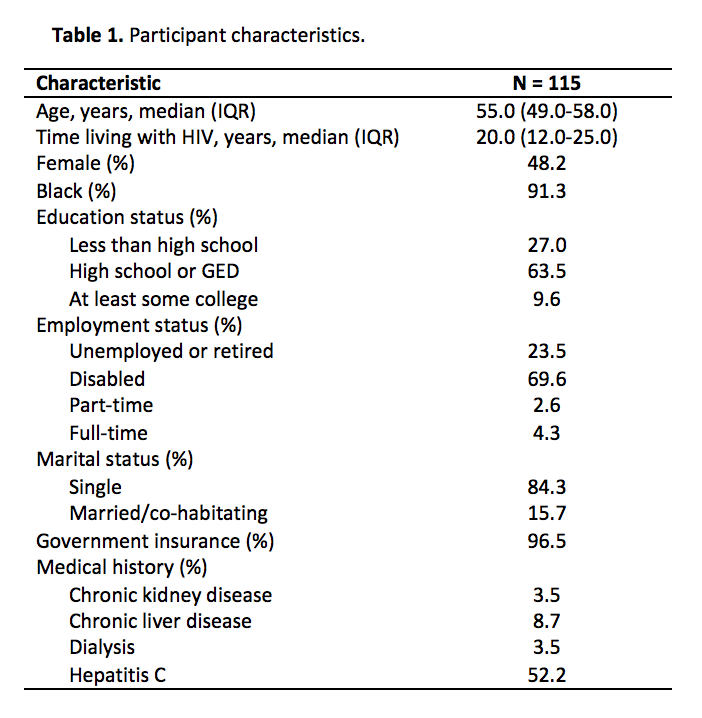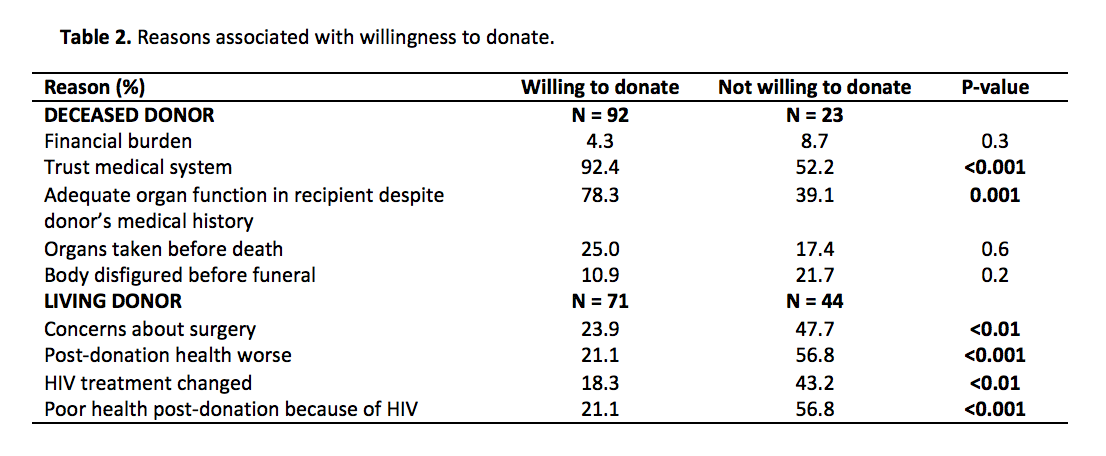Willingness to Donate Organs Among Persons Living with HIV.
S. Halpern, K. Kumar, A. Nguyen, S. Rasmussen, S. Anjum, A. Massie, A. Tobian, D. Segev, J. Sugarman, C. Durand.
JHU, Baltimore, MD
Meeting: 2017 American Transplant Congress
Abstract number: A308
Session Information
Session Name: Poster Session A: Viral Conundrums
Session Type: Poster Session
Date: Saturday, April 29, 2017
Session Time: 5:30pm-7:30pm
 Presentation Time: 5:30pm-7:30pm
Presentation Time: 5:30pm-7:30pm
Location: Hall D1
HIV-to-HIV organ transplants could shorten waitlist times among both HIV-infected (HIV+) and uninfected (HIV-) individuals. However, it is unknown whether HIV+ individuals are willing to donate organs.
METHODS: We conducted a survey of willingness to donate among HIV+ individuals using a convenience sample at our institution. Fisher's exact and chi-squared tests were used to compare responses between respondents who were willing or unwilling to donate.
RESULTS: Among 115 survey respondents, median age was 55, median duration of HIV infection was 20 years, 51.8% were male, 91.3% were black, 96.5% had government insurance, and 52.2% were Hepatitis C-infected (Table 1). There was broad willingness to donate: 80.0% as deceased donors and 61.7% as living donors. However, only 20.9% were registered organ donors. Compared to those who were unwilling to donate, those who were willing to be deceased donors were more likely to trust the medical system (p<0.001) and believe that their HIV infection would not affect organ function in transplant recipients (p=0.001). Participants who were willing to be living donors were less likely to have concerns about going through surgery (p<0.01), to believe that donation would worsen their health (p<0.001), cause their HIV treatment to be changed (p<0.01), or cause poor health due to HIV (p<0.001) than those who were unwilling to do so (Table 2).
CONCLUSIONS: A majority of HIV+ individuals at our institution expressed willingness to be organ donors. This supports the recently enacted HIV Organ Policy Equity Act's potential to expand the donor pool by permitting these transplants under research protocols. If HIV-to-HIV transplants are found to be safe, effective and feasible, they may attenuate the organ shortage crisis.

CITATION INFORMATION: Halpern S, Kumar K, Nguyen A, Rasmussen S, Anjum S, Massie A, Tobian A, Segev D, Sugarman J, Durand C. Willingness to Donate Organs Among Persons Living with HIV. Am J Transplant. 2017;17 (suppl 3).
To cite this abstract in AMA style:
Halpern S, Kumar K, Nguyen A, Rasmussen S, Anjum S, Massie A, Tobian A, Segev D, Sugarman J, Durand C. Willingness to Donate Organs Among Persons Living with HIV. [abstract]. Am J Transplant. 2017; 17 (suppl 3). https://atcmeetingabstracts.com/abstract/willingness-to-donate-organs-among-persons-living-with-hiv/. Accessed February 19, 2026.« Back to 2017 American Transplant Congress
